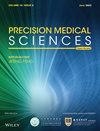Cell‐free DNA integrity correlates with lymph node metastasis and predicts short‐term postoperative recurrence in patients with proximal gastric carcinoma after curative gastrectomy
IF 0.6
Q4 MEDICINE, RESEARCH & EXPERIMENTAL
引用次数: 0
Abstract
The predictive value of cell‐free DNA (cfDNA) integrity for lymph node metastasis and short‐term postoperative recurrence in patients with proximal gastric carcinoma (PGC) after curative gastrectomy remains unclear. From August 2019 to March 2021, the cfDNA integrity was assessed in 107 patients with proximal gastric carcinoma who underwent total gastrectomy (TG). The correlation between cfDNA integrity and lymph node metastasis was inspected, and the optimal cutoff value of cfDNA integrity for lymph node metastasis was determined. Meanwhile, the cfDNA integrity was identically detected in 91 proximal gastric cancer patients receiving proximal gastrectomy (PG), as well as 41 heathy individuals. The diagnostic value of cfDNA integrity for short‐term postoperative recurrence was assessed in both cohorts. The cfDNA integrity in healthy control was significantly higher than that in TG (p < .001) and PG (p = .0003) cohorts, but not statistically different between the latter two (p = .540). In the TG cohort, the cfDNA integrity was closely correlated to lymph node metastasis. Using the cutoff value of 0.873, the patients were stratified into the cfDNA integrity high and low groups; low cfDNA integrity was associated with a shorter disease free survival (DFS) both in the TG (p = .011) and PG (p = .041) cohorts. Moreover, cfDNA integrity was assessed to possess the most predictive value for postoperative recurrence by ROC curves in both cohorts. Therefore, the cfNDA integrity may correlate with lymph node metastasis in patients with PGC, and predict short‐term recurrence after curative gastrectomy.无细胞DNA完整性与淋巴结转移相关,并预测根治性胃切除术后近端胃癌患者术后短期复发
游离细胞DNA (cfDNA)完整性对治愈性胃切除术后近端胃癌(PGC)患者淋巴结转移和术后短期复发的预测价值尚不清楚。2019年8月至2021年3月,对107例接受全胃切除术(TG)的近端胃癌患者的cfDNA完整性进行了评估。检测cfDNA完整性与淋巴结转移的相关性,确定cfDNA完整性与淋巴结转移的最佳临界值。同时,在91例接受近端胃切除术(PG)的近端胃癌患者和41例健康个体中检测到的cfDNA完整性相同。在两个队列中评估cfDNA完整性对术后短期复发的诊断价值。健康对照组的cfDNA完整性显著高于TG组(p < 0.001)和PG组(p = 0.0003),后两者之间无统计学差异(p = 0.540)。在TG队列中,cfDNA完整性与淋巴结转移密切相关。采用截断值0.873将患者分为cfDNA完整性高组和低组;在TG组(p = 0.011)和PG组(p = 0.041)中,cfDNA完整性低与较短的无病生存期(DFS)相关。此外,在两个队列中,通过ROC曲线评估cfDNA完整性对术后复发具有最大的预测价值。因此,cfNDA完整性可能与PGC患者的淋巴结转移有关,并预测根治性胃切除术后的短期复发。
本文章由计算机程序翻译,如有差异,请以英文原文为准。
求助全文
约1分钟内获得全文
求助全文

 求助内容:
求助内容: 应助结果提醒方式:
应助结果提醒方式:


